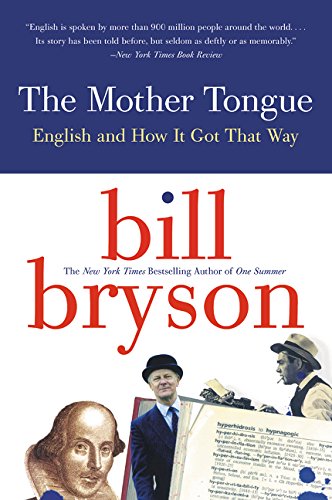And yet in Britain, despite the constant buffetings of history, English survived. It is a cherishable irony that a language that succeeded almost by stealth, treated for centuries as the inadequate and second-rate tongue of peasants, should one day become the most important and successful language in the world. — The Mother Tongue: English and How It Got That Way , Bill Bryson
I was raised in the Southeast Asian archipelago of Indonesia, over 7000 miles away from England. Yet, over hundreds of years, the English language now dictates most of the communication in my life. Even this review is both written and read in English. After reading The Mother Tongue, I understood the manner in which English spread across the globe, while also exploring why it can often be a terribly confusing language.
I was aware of Bill Bryson as a humorous travel writer. So seeing his name as the author of a book about the development of the English language piqued my curiosity. Part of me knew that Bryson would be able to capture the absurdity that is the English language, both by fully exposing the underlying history as well as by explaining the content in a comedic fashion.
The reading experience can be quite slow when the book gets technical; many of the chapters include long examples that properly convey Bryson’s points but potentially drag on for the reader. That is not to say that taking the time to read these technical examples is boring. In one chapter, Bryson lays out a list of words, asking the reader to see which of the words are misspelled. As it turns out, every single word is misspelled, only to prove his point of the annoying variation of spelling in English and that no one is as good of a speller as they think they are. For the most part, these drawn out sections of the book work well to paint the larger narrative of the origin story of the English language.
I appreciate the level of detail in Bryson’s writing. It is these little details that act as trivia pointers for the reader to take away from the book and show off to friends. I mean, who wouldn’t want to be able to point out the ambiguous history surrounding the lack of the letter ‘u’ from the word ‘forty’? The book is chock-full of these quirky facts about English, more than enough to satisfy the average wannabe English scholar.
Among Bryson’s main points, the book refuses to claim the truth when certain parts of history remain unclear. The book instead offers multiple interpretations to why certain parts of the language are the way they are. As a history nerd myself, I thoroughly appreciated following the historical narrative that plots the course for the spread of English throughout the globe.
The Mother Tongue is rife in details and technicalities of English, all in an effort to build Bryson’s depiction of the story of English. I now find myself constantly questioning why parts of the English language can be so frustrating. More importantly, however, I gained a better appreciation of language and the way it evolves.
